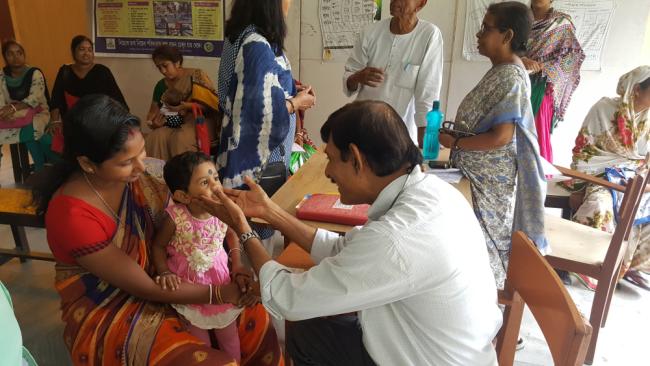Identifying barriers to life-saving diarrhea care
March 5, 2024
Identifying barriers to life-saving diarrhea care
At a Glance
- A study in India found that children with diarrhea often aren’t given oral rehydration salts because providers assume that parents prefer other treatments.
- Strategies are needed to raise awareness among health care providers that most parents would likely choose this simple, life-saving intervention.

Diarrhea kills almost half a million children in low- and middle-income countries every year. Though antibiotics may be prescribed to treat diarrhea, this use is often inappropriate, as most cases of diarrhea in children are caused by viral infections, not bacteria.
Studies have estimated that almost all childhood deaths from diarrhea could be prevented with the use of oral rehydration salts (ORS). These are inexpensive mixtures of sugar and electrolytes that are dissolved in water to make a therapeutic drink. Despite their life-saving potential, ORS are still not prescribed for around half the children who need them. This gap occurs even though health care providers report being aware of their benefits.
Understanding what drives this gap between knowledge and action is essential to designing strategies to increase prescription levels of ORS. In a new NIH-funded study, researchers led by Dr. Zachary Wagner from the RAND Corporation and Dr. Neeraj Sood from the University of Southern California examined three potential drivers of low ORS prescription levels in India.
The team examined perceived parent treatment preferences, financial incentives for prescriptions, and supply levels of ORS. To test these drivers, they trained 25 actors to portray fathers seeking care for their two-year olds with diarrhea. The actors visited more than 2,000 private clinics and pharmacies across more than 250 towns in two Indian states.
To address parent treatment preferences, the researchers altered the script for the actors randomly. The fathers either stated a preference for ORS, a preference for antibiotics, or no preference. To test the influence of financial incentives, in about half of the visits the fathers stated that they would buy any prescribed drugs elsewhere. This could reduce incentives for health care providers to prescribe more expensive antibiotics. To address supply, the researchers randomly assigned clinics to receive extra deliveries of ORS. Results from the study were published on February 9, 2024, in Science.
Before the start of the study, 86% of health care providers at the clinics said that they would provide ORS to a child with diarrhea. However, during the study, only 28% did so when fathers didn’t express any preference. When fathers said they preferred ORS, prescriptions almost doubled, to 55%.
Surveys previously found that about half of parents would prefer ORS, but that health care providers wrongly think this number is much lower. The researchers calculated that about 42% of the underprescription problem is driven by such mistaken perceptions.
In contrast, manipulating financial incentives and increasing the supply of ORS both had modest effects on the number of prescriptions. The researchers calculated that, together, these two drivers account for about 11% of the ORS underprescription problem.
“We need to find ways to change providers’ perceptions of patient preferences to increase ORS use and combat antibiotic resistance, which is a huge problem globally,” Wagner says.
Though the three barriers explored in the study may account for more than half of the under-prescription problem, more work is needed to identify other barriers to the use of ORS.
—by Sharon Reynolds
Related Links
- Supplement Targets Gut Microbes to Boost Growth in Malnourished Children
- Nutrition Supplement Increases Infant Birth Size
- Probiotics Not Helpful for Young Children with Diarrhea
- Probiotic Prevents Infant Infections in Rural India
- Diarrhea
- Chronic Diarrhea in Children
- Viral Gastroenteritis
- Oral Rehydration Salts
References
What drives poor quality of care for child diarrhea? Experimental evidence from India. Wagner Z, Mohanan M, Zutshi R, Mukherji A, Sood N. Science. 2024 Feb 9;383(6683):eadj9986. doi: 10.1126/science.adj9986. Epub 2024 Feb 9. PMID: 38330118.
Funding
NIH’s National Institute of Diabetes and Digestive and Kidney Diseases (NIDDK).


